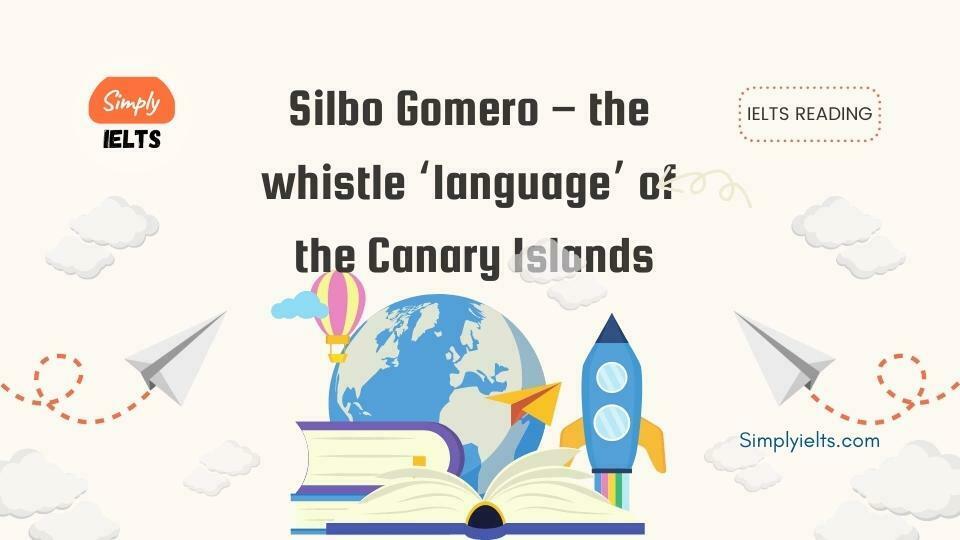Silbo Gomero – the whistle ‘language’ of the Canary Islands IELTS reading test with answers and explanation
A new IELTS Reading Academic test passage 2 from Cambridge IELTS 15 Reading test 4 Silbo Gomero – the whistle ‘language’ of the Canary Islands IELTS reading test with answers and location
In this IELTS Reading exam, you will find Silbo Gomero – the whistle ‘language’ of the Canary Islands IELTS reading test answers with location and explanation

In the answers tab, you can find Silbo Gomero – the whistle ‘language’ of the Canary Islands IELTS reading answers with location
Silbo Gomero – the whistle ‘language’ of the Canary Islands IELTS reading test answers and explanation
READING PASSAGE 2
You should spend about 20 minutes on Questions 14-26 which are based on Reading Passage 2 below.
Silbo Gomero – the whistle ‘language’ of the Canary Islands
La Gomera is one of the Canary Islands situated in the Atlantic Ocean off the northwest coast of Africa. This small volcanic island is mountainous, with steep rocky slopes and deep, wooded ravines, rising to 1,487 metres at its highest peak. It is also home to the best known of the world’s whistle ‘languages’, a means of transmitting information over long distances which is perfectly adapted to the extreme terrain of the island.
This ‘language’, known as ‘Silbo’ or ‘Silbo Gomero’ – from the Spanish word for ‘whistle’ – is now shedding light on the language-processing abilities of the human brain, according to scientists. Researchers say that Silbo activates parts of the brain normally associated with spoken language, suggesting that the brain is remarkably flexible in its ability to interpret sounds as language.
‘Science has developed the idea of brain areas that are dedicated to language, and we are starting to understand the scope of signals that can be recognised as language,’ says David Corina, co-author of a recent study and associate professor of psychology at the University of Washington in Seattle.
Silbo is a substitute for Spanish, with individual words recoded into whistles which have high- and low-frequency tones. A whistler – or silbador – puts a finger in his or her mouth to increase the whistle’s pitch, while the other hand can be cupped to adjust the direction of the sound. ‘There is much more ambiguity in the whistled signal than in the spoken signal,’ explains lead researcher Manuel Carreiras, psychology professor at the University of La Laguna on the Canary island of Tenerife. Because whistled ‘words’ can be hard to distinguish, silbadores rely on repetition, as well as awareness of context, to make themselves understood.
The silbadores of Gomera are traditionally shepherds and other isolated mountain folk, and their novel means of staying in touch allows them to communicate over distances of up to 10 kilometres. Carreiras explains that silbadores are able to pass a surprising amount of information via their whistles. ‘In daily life they use whistles to communicate short commands, but any Spanish sentence could be whistled.’ Silbo has proved particularly useful when fires have occurred on the island and rapid communication across large areas has been vital.
The study team used neuroimaging equipment to contrast the brain activity of silbadores while listening to whistled and spoken Spanish. Results showed the left temporal lobe of the brain, which is usually associated with spoken language, was engaged during the processing of Silbo. The researchers found that other key regions in the brain’s frontal lobe also responded to the whistles, including those activated in response to sign language among deaf people. When the experiments were repeated with non-whistlers, however, activation was observed in all areas of the brain.
‘Our results provide more evidence about the flexibility of human capacity for language in a variety of forms,’ Corina says. ‘These data suggest that left-hemisphere language regions are uniquely adapted for communicative purposes, independent of the modality of signal. The non-Silbo speakers were not recognising Silbo as a language. They had nothing to grab onto, so multiple areas of their brains were activated.’
Carreiras says the origins of Silbo Gomero remain obscure, but that indigenous Canary Islanders, who were of North African origin, already had a whistled language when Spain conquered the volcanic islands in the 15th century. Whistled languages survive today in Papua New Guinea, Mexico, Vietnam, Guyana, China, Nepal, Senegal, and a few mountainous pockets in southern Europe. There are thought to be as many as 70 whistled languages still in use, though only 12 have been described and studied scientifically. This form of communication is an adaptation found among cultures where people are often isolated from each other, according to Julien Meyer, a researcher at the Institute of Human Sciences in Lyon, France. ‘They are mostly used in mountains or dense forests,’ he says. ‘Whistled languages are quite clearly defined and represent an original adaptation of the spoken language for the needs of isolated human groups.’
But with modern communication technology now widely available, researchers say whistled languages like Silbo are threatened with extinction. With dwindling numbers of Gomera islanders still fluent in the language, Canaries’ authorities are taking steps to try to ensure its survival. Since 1999, Silbo Gomero has been taught in all of the island’s elementary schools. In addition, locals are seeking assistance from the United Nations Educational, Scientific and Cultural Organization (UNESCO). ‘The local authorities are trying to get an award from the organisation to declare [Silbo Gomero] as something that should be preserved for humanity,’ Carreiras adds.
Now start to answer “Silbo Gomero – the whistle ‘language’ of the Canary Islands IELTS reading test” questions. You will have 20 minutes to answer questions 14 to 26.
.You can download answers as a pdf file from here:
Related articles:
- A step by step guide to improve IELTS Letter writing from 6.5 bands to 8 bands
- IELTS Writing
- A step by step guide to IELTS Writing Task 1 General Training
- General Information about IELTS General Writing Task 1 test
- How to Manage Time on IELTS Writing Task 2?
- IELTS writing task 2 online course
Silbo Gomero – the whistle ‘language’ of the Canary Islands IELTS reading test Questions
click Finish exam to check the correct answers
Silbo Gomero – the whistle ‘language’ of the Canary Islands IELTS Reading Answers
| Questions | Answers |
|---|---|
| 14 | NOT GIVEN |
| 15 | FALSE |
| 16 | TRUE |
| 17 | FALSE |
| 18 | FALSE |
| 19 | TRUE |
| 20 | words |
| 21 | finger |
| 22 | direction |
| 23 | commands |
| 24 | fires |
| 25 | technology |
| 26 | award |



Responses